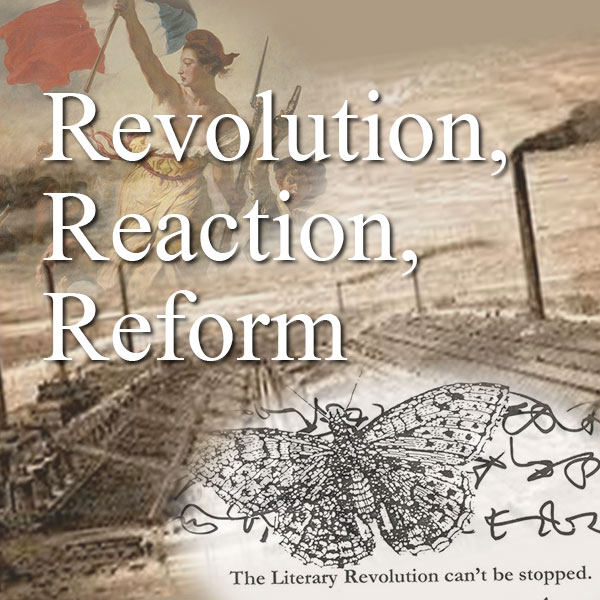MSSU ENG272 - Fall 2020 Dashboard
Description
 British Literature II: Revolution, Reaction, Reform examines British literature from the late eighteenth century to the present, a period that witnessed the American and French Revolutions, slave revolts such as the Haitian Revolution, a “revolution in female manners,” the Industrial Revolution, the twentieth-century revolutionary wave in Europe, as well as World War I and World War II, and, of course, artistic revolutions. We will consider how the authors and literary works of this period might be reacting to change, advocating for reform, or participating in literary revolutions—whether revolution is understood in the sense of “revolving” or of “revolting,” going full circle to return to a previous (more perfect?) time or experiencing/effecting a great alteration or rupture.
British Literature II: Revolution, Reaction, Reform examines British literature from the late eighteenth century to the present, a period that witnessed the American and French Revolutions, slave revolts such as the Haitian Revolution, a “revolution in female manners,” the Industrial Revolution, the twentieth-century revolutionary wave in Europe, as well as World War I and World War II, and, of course, artistic revolutions. We will consider how the authors and literary works of this period might be reacting to change, advocating for reform, or participating in literary revolutions—whether revolution is understood in the sense of “revolving” or of “revolting,” going full circle to return to a previous (more perfect?) time or experiencing/effecting a great alteration or rupture.
We'll be using the following texts at COVE Studio in the anthology British Literature II (MSSU), Fall 2020:
Wordsworth, William, "We Are Seven" (1798)
Coleridge, Samuel Taylor, "Eolian Harp" (1795)
Coleridge, Samuel Taylor, "Metrical Feet: Lesson for a Boy"
Shelley, Mary, Frankenstein; or, The Modern Prometheus (1818)
Browning, Robert, "Porphyria's Lover" (1836)
Browning, Robert, "My Last Duchess" (1842)
Browning, Robert, "Soliloquy of the Spanish Cloister” (1842)
Tennyson, Alfred, "The Lady of Shalot" (1832 and 1842)
Browning, Elizabeth Barrett, "The Cry of the Children" (1843)
Hood, Thomas, "The Song of the Shirt" (1843)
Brooke, Rupert, "The Soldier" (1914)
Eliot, T. S., "The Love Song of J. Alfred Prufrock" (1915, 1917)
Woolf, Virginia, "The Mark on the Wall" (1921)
Auden, W.H., "Musée des Beaux Arts" (1939, 1940)
Thomas, Dylan, "Do Not Go Gentle into That Good Night" (1951)
Galleries, Timelines, and Maps
There is no content in this group.
